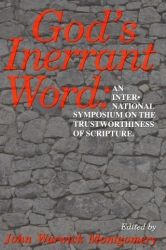The question of authority is ever the ultimate question. Yet authority is precisely what our generation despises, and in such an atmosphere the claims of Scripture inevitably fall on bad times. But Scripture claims divine authority nonetheless, and as the very word of God himself it claims to be without error.
Just how has the church understood these claims in the past? And how ought the church to understand these claims today in this “enlightened” age? Can the modern – or postmodern – be expected to acknowledge biblical inerrancy?
In this landmark book, newly republished, an all-star team of theologians speak to this issue with insight and clarity, providing for Christians of our generation an important resource on one of the major implicates of biblical inspiration: God neither lies nor makes mistake; his word is without error.
Contributors
John Frame
John Gerstner
Peter Jones
John Warwick Montgomery
J.I. Packer
Clark Pinnock
R.C. Sproul
Introduction by R.C. Sproul
At the turn of the century, Abraham Kuyper warned of the possibility that developing trends in the higher criticism of the Christian Scriptures could become an exercise in “Biblical vandalism.” That warning is no longer a future possibility but a fait accompli. More and more Biblical criticism comes from a context of anti-historical and anti-revelational ideologies. The result has been confusion, skepticism, and despair. Church communities have opted for pluralistic and relativistic theology in order to accommodate the loss of authority. “Studied ambiguity” is the hallmark of modern confessional statements. In a word, the foundations of the church have been rudely shaken.
Each generation of Christian believers must deal afresh with the question of authority. A mere restatement of former views without reference to contemporary issues is inadequate: a de novo statement divorced from all past reflection is irresponsible. Thus, this volume appears as a contemporary attempt to speak stereoscopically to the modern vacuum of authority—with one eye on contemporary issues and the other on the wisdom of the history of the church.
The essays in this book were written as research articles for delivery at the Conference on the Inspiration and Authority of Scripture, Ligonier, Pennsylvania, in the fall of 1973.
Table of Contents
1. Biblical Inerrancy: What’s At Stake?
John Warwick Montgomery
2. “Sola Scriptura” in History and Today
J.I. Packer
3. Lessons from Luther on the Inerrancy of Holy Writ
John Warwick Montgomery
4. Calvin’s View of Scripture
J.I. Packer
5. Warfield’s Case for Biblical Inerrancy
John H. Gerstner
6. Limited Inerrancy: A Critical Appraisal and Constructive Alternative
Clark H. Pinnock
7. God and Biblical Language: Transcendence and Immanence
John M. Frame
8. Scripture: Speaks for Itself
John M. Frame
9. The Inspiration of Scripture and the Authority of Jesus Christ
Clark H. Pinnock
10. The Apostle Paul: Second Moses to the New Covenant Community:
A Study in Pauline Apostolic Authority
Peter R. Jones
11. The Case for Inerrancy: A Methodological Analysis
R.C. Sproul
Appendix: The Approach of New Shape Roman Catholicism to Scriptural Inerrancy: A Case Study
John Warwick Montgomery
Highly recommended.
Buy the books

God’s Inerrant Word: An International Symposium on the Trustworthiness of Scripture